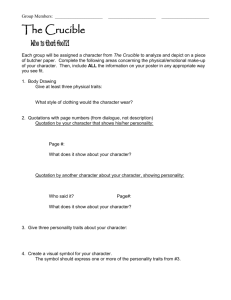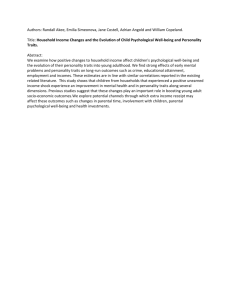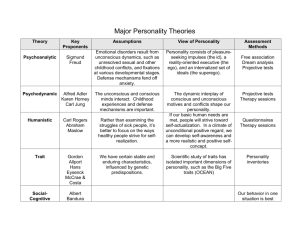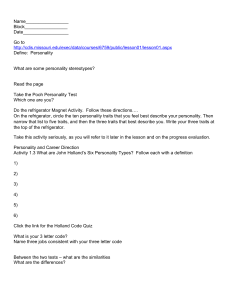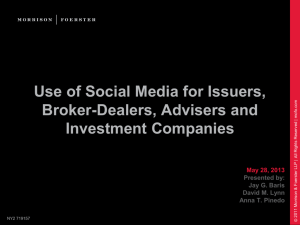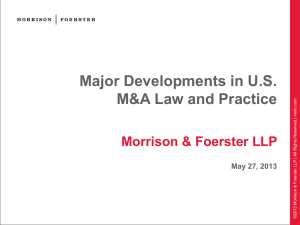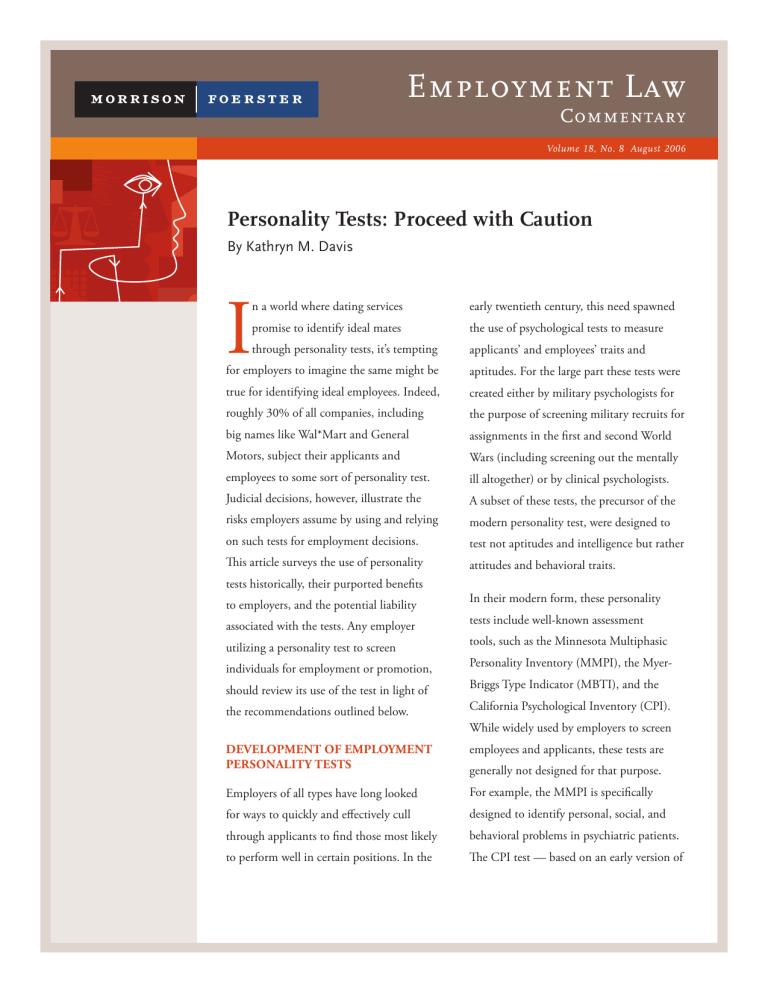
Employment Law
Commentary
Volume 18, No. 8 August 2006
Personality Tests: Proceed with Caution
By Kathryn M. Davis
I
n a world where dating services
early twentieth century, this need spawned
promise to identify ideal mates
the use of psychological tests to measure
through personality tests, it’s tempting
applicants’ and employees’ traits and
for employers to imagine the same might be
aptitudes. For the large part these tests were
true for identifying ideal employees. Indeed,
created either by military psychologists for
roughly 30% of all companies, including
the purpose of screening military recruits for
big names like Wal*Mart and General
assignments in the first and second World
Motors, subject their applicants and
Wars (including screening out the mentally
employees to some sort of personality test.
ill altogether) or by clinical psychologists.
Judicial decisions, however, illustrate the
A subset of these tests, the precursor of the
risks employers assume by using and relying
modern personality test, were designed to
on such tests for employment decisions.
test not aptitudes and intelligence but rather
This article surveys the use of personality
attitudes and behavioral traits.
tests historically, their purported benefits
to employers, and the potential liability
associated with the tests. Any employer
utilizing a personality test to screen
individuals for employment or promotion,
should review its use of the test in light of
the recommendations outlined below.
In their modern form, these personality
tests include well-known assessment
tools, such as the Minnesota Multiphasic
Personality Inventory (MMPI), the MyerBriggs Type Indicator (MBTI), and the
California Psychological Inventory (CPI).
While widely used by employers to screen
Development of Employment
Personality Tests
employees and applicants, these tests are
Employers of all types have long looked
For example, the MMPI is specifically
for ways to quickly and effectively cull
designed to identify personal, social, and
through applicants to find those most likely
behavioral problems in psychiatric patients.
to perform well in certain positions. In the
The CPI test — based on an early version of
generally not designed for that purpose.
morrison
&
foerster llp
the MMPI — is primarily used as an
In addition to the concern that the tests
applicant for a security officer position
assessment tool for psychologists.
may be unhelpful or ineffectual, case
with Dayton Hudson, challenged its
law teaches that the tests can expose
use of “Psychscreen,” a personality
Benefits of Tests for
Employers
employers to litigation and damages.
test based on a combination of the
Claims related to these tests have been
MMPI and the CPI. The Psychscreen
The appeal of personality tests is
based predominately on theories of
test included questions related to the
obvious. First, they lend objectivity to
invasion of privacy and discrimination,
nature and depth of the applicant’s
decisions that may otherwise be largely
and most recently on the theory they
religious faith and sexual orientation.
subjective. Second, they may more
constitute impermissible medical
The applicant’s answers to the test were
accurately predict success in a position
examinations under the Americans
processed by a consulting psychologist
than typical interviewing methods. For
with Disabilities Act (ADA).
firm that interpreted the answers and
example, though it is widely believed
that certain types of personalities are
more suitable for certain positions,
Invasion of Privacy/
Discrimination
recommended either hire or no-hire
based on the applicant’s rating on five
traits: emotional stability, interpersonal
e.g., that extroverts are better suited
Because many of the personality
for sales positions, it may be difficult
tests utilized by employers came
to assess from an interview (where the
into existence as assessment tools for
individual is intentionally projecting
mental health professionals, the tests
Soroka asserted that the use of the
the image he or she believes the
often inquire into topics far removed
religion and sexual orientation-based
employer wants to see) whether an
from the workplace. This is true even
questions invaded the applicants’
applicant truly possesses the sought-
where the tests have purportedly been
privacy and discriminated against the
after trait. Use of personality tests,
tailored for the hiring process. As a
applicants based on protected traits.
it is believed, allows the employer to
result, applicants for hire or promotion
To prevent further such invasions and
identify desirable personalities and then
may be confronted with very personal
discrimination during the pendency of
screen for those traits.
questions eliciting information, for
the suit, Soroka sought a preliminary
example, related to their religious
injunction. The trial court denied
beliefs and sexual orientation. These
the request, finding that Soroka was
sorts of questions have troubled
unlikely to prevail on his claims. On
applicants and courts because they seek
appeal, the appellate court reversed,
information related to the applicants’
ruling Soroka was likely to succeed at
private life unconnected to job-related
trial.
While obviously attractive to
employers, personality tests may
have significant downsides. Chief
among these is the concern that the
tests may not actually achieve their
intended goal. Each of the widely
used tests has encountered criticism
(most particularly the MBTI has been
criticized for lacking scientific basis),
and there appear to be questions as to
criteria or performance standards. As
a result, these and similar questions
have long been the basis of invasion of
privacy and discrimination claims.
style, addiction potential, dependability
and reliability, and socialization.
Specifically, the court ruled that before
an employer can inquire into an
applicant’s or employee’s private life,
the employer must establish that it
whether psychological personality tests
For example, in Soroka v. Dayton
has a compelling interest to do so and
can be validated for their effectiveness
Hudson Corporation, 18 Cal. App.
that the inquiry has a direct nexus to
in employment situations.
4th 1200 (1991), Soroka, a successful
that compelling interest. Thus, here,
1
Page employment law commentary
the employer had to show, e.g., that
The ADA prohibits employers from
whether the individual worked well
emotional stability was necessary for
subjecting applicants (either for hire
under stress or in large groups. The
the performance of the security officer
or for promotion) to pre-selection
MMPI test, however, was designed
position and that a person’s religious
medical examinations.4 While the
also to measure other traits, such as
beliefs or sexual orientation have a
ADA itself does not define medical
depression, paranoia, and mania, and
bearing on that person’s emotional
examinations, the EEOC defines
even certain psychiatric disorders, and
stability or ability to perform the
medical examinations as “a procedure
included true/false questions such
security officer job duties.
or test that seeks information about
as “I commonly hear voices without
an individual’s physical or mental
knowing where they are coming from”
impairments or health.” With respect
and “I have a habit of counting things
to psychological tests, the EEOC draws
that are not important such as bulbs on
the line between tests that are designed
electrical signs….”7
Additionally, the court ruled that
inquiries related to protected categories
must be justified as job-related.2 The
Fair Employment and Housing Act
(FEHA) prohibits non-job-related
inquiries that express, directly or
indirectly, any limitation, specification,
or discrimination as to race, religion,
color, national origin, ancestry,
physical or mental disability, medical
5
to identify a mental disorder or
impairment (which constitute medical
examinations) and psychological tests
that measure personality traits such as
honesty, preferences, and habits (which
do not).6
RAC argued that its intent to use the
test to divine personality traits should
control with respect to whether its
use of the MMPI violates the ADA.
The court rejected this position. The
court found “the practical effect of the
condition, marital status, sex, age,
This dichotomy raises the question:
use of the MMPI is similar no matter
or sexual orientation.3 To overcome
what if the employer’s personality test
how the test is used or scored — that
this prohibition, the employer must
was designed to reveal mental disorders
is, whether or not RAC used the test
demonstrate that the inquiry is
or impairments — for example, the
to weed out applicants with certain
sufficiently related to an essential
employer uses the MMPI or a test
function of the position to warrant
based on it, but the employer intends
its use. For example, the employer
to use it only for identifying personality
was required to show that a person’s
traits. In Karracker v. Rent-A-Center,
religious beliefs had a bearing on that
Inc., 411 F.3d 831, 837 (7th Cir.
person’s ability to perform as a security
2005), the Seventh Circuit addressed
officer.
just this question.
Impermissible PreSelection Medical
Examination
In Karracker, employees applying
deemed a medical examination, and its
for management-level positions at
use will violate the ADA.
More recently, employers using
to take the MMPI test, the results of
Recommendations
psychological personality tests have
which were considered by RAC in
Employers currently using or
faced suits asserting that the tests
making promotion decisions. RAC
considering using personality tests for
constitute impermissible pre-selection
maintained that it used the MMPI test
to measure personality traits, such as
selection decisions should take steps to
medical examinations under the ADA.
disorders, its use of the MMPI likely
had the effect of excluding employees
with disorders from promotions.” In
other words, where a personality test
is designed, at least in part, to reveal
mental illness and has the effect of
hurting the employment prospects of
a disabled employee, the test will be
Rent-A-Center (RAC) were required
Page morrison
This newsletter addresses recent employment law developments. Because of its generality, the information
provided herein may not be applicable in all situations
and should not be acted upon without specific legal
advice based on particular situations.
&
foerster llp
review both the questions posed by the
the test is based on or incorporates
tests and the genesis of the tests.
an earlier or existing test used to
Editor: Lloyd W. Aubry, Jr., (415) 268-6558
identify or assess mental disorders or
San Francisco
--------------------------------------------------------------
All questions which solicit personal/
James E. Boddy, Jr.
evaluated to determine whether the
--------------
employer has a compelling reason
1
Lloyd W. Aubry, Jr.
James C. Paras
Linda E. Shostak
(415) 268-6558
laubry@mofo.com
(415) 268-7081
jboddy@mofo.com
(415) 268-7087
jparas@mofo.com
(415) 268-7202
lshostak@mofo.com
Palo Alto
-----------------------------------------------------------David J. Murphy
Eric A. Tate
Raymond L. Wheeler
Tom E. Wilson
(650) 813-5945
dmurphy@mofo.com
(650) 813-5791
etate@mofo.com
(650) 813-5656
rwheeler@mofo.com
(650) 813-5604
twilson@mofo.com
Los Angeles
-----------------------------------------------------------Sarvenaz Bahar
Timothy F. Ryan
Janie F. Schulman
B. Scott Silverman
(213) 892-5744
sbahar@mofo.com
(213) 892-5388
tryan@mofo.com
(213) 892-5393
jschulman@mofo.com
(213) 892-5401
bsilverman@mofo.com
New York
-----------------------------------------------------------Miriam H. Wugmeister
(212) 506-7213
mwugmeister@mofo.com
Washington, D.C./Northern Virginia
----------------------------------------------------------Ann B. Stevens
Daniel P. Westman
(703) 760-7336
annstevens@mofo.com
(703) 760-7795
dwestman@mofo.com
Orange County
-----------------------------------------------------------Robert A. Naeve
Steven M. Zadravecz
(949) 251-7541
rnaeve@mofo.com
(949) 251-7532
szadravecz@mofo.com
San Diego
-----------------------------------------------------------Rick Bergstrom
Craig A. Schloss
(858) 720-5143
rbergstrom@mofo.com
(858) 720-5134
cschloss@mofo.com
Denver
-----------------------------------------------------------Steven M. Kaufmann
Tarek F.M. Saad
(303) 592-2236
skaufmann@mofo.com
(303) 592-2269
tsaad@mofo.com
private information should be
for the inquiry and whether there is
a direct nexus between the inquiry
and that compelling reason. Likewise,
all questions that relate to any of the
statutorily protected characteristics
(in California: race, religion, color,
national origin, ancestry, physical or
mental disability, medical condition,
marital status, sex, age, or sexual
orientation) should be examined
to determine whether the inquiry
impairments.
According to a survey performed by the
Aberdeen Group, 49% of employers using
psychological personality tests in the hiring
process saw no improvement in employee
turnover, suggesting that the test did no better
job-matching applicants to positions than more
traditional selection methods.
At the time of the suit, the Fair Employment
and Housing Act (FEHA) had not yet been
revised to protect against discrimination on
the basis of sexual orientation. Thus, Soroka’s
challenge relied on Labor Code 1101 and
1102, which were interpreted to forbid such
discrimination by private employers. Since
FEHA’s revision, the court’s rulings with respect
to the religion-based questions would apply
equally to those questions inquiring into the
applicant’s sexual orientation.
2
3
Cal. Gov’t Code § 12940(d).
is sufficiently related to an essential
4
42 U.S.C. § 12112(d)(1).
function of the position. Counsel
5
should be contacted if any inquiry fails
to meet these standards.
ADA Enforcement Guidance:
Preemployment Disability-Related Questions
and Medical Examinations (1995).
6
Id.
RAC used the then current version of the
MMPI. The MMPI has been significantly
revised, eliminating many of the true-false
statements found objectionable by applicants
and employees.
7
Further, Karracker makes it clear
that the burden is on the employer
to investigate the genesis of any
personality test used and to ensure that
--------------
it is designed solely to test personality
traits, or to validate that the test is not
having a disparate impact on disabled
employees. Thus, employers — at the
very least — should enquire as to the
source of their tests, including whether
London
-----------------------------------------------------------Ann Bevitt
44-20-7896-5841
abevitt@mofo.com
Kathryn Davis is an associate in
our Walnut Creek office and can
be reached at (925) 295-3372 or
kathryndavis@mofo.com.
If you have a change of address, please write to Chris
Lenwell, Morrison & Foerster llp, 425 Market Street,
San Francisco, California 94105-2482, or e-mail him at
clenwell@mofo.com.
www.mofo.com
© 2006 Morrison & Foerster LLP. All Rights Reserved.
Page






